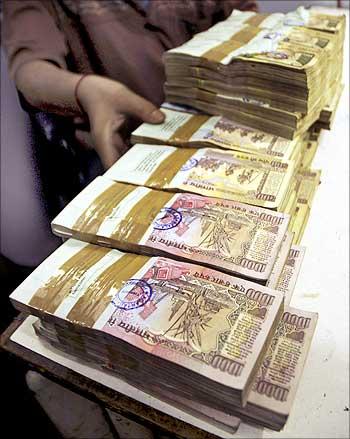 The International Monetary Fund (IMF) has slashed India's growth forecast to 4.9 per cent for 2012 due to low business confidence and "sluggish structural reforms".
The International Monetary Fund (IMF) has slashed India's growth forecast to 4.9 per cent for 2012 due to low business confidence and "sluggish structural reforms".
The IMF had in July projected a growth rate of 6.1 per cent for the current year. During the first quarter ended June 2012, Indian economy expanded by 5.5 per cent.
"India's activity suffered from waning business confidence amid slow approvals for new projects, sluggish structural reforms, policy rate hikes designed to rein in inflation, and flagging external demand," IMF said in the World Economic Outlook (WEO) released in Tokyo ahead of the IMF-World Bank 2012 Annual Meetings.
In India, the report said, "growth weakened more than expected in the first half of 2012, an outcome of stalled investment caused by governance issues and red tape, and a deterioration in business sentiment against the backdrop of a rising current account deficit and the recent rupee depreciation."
Compared with the region's growth performance in recent years, the near- and medium-term outlooks are less buoyant, the report said.
The report has projected 6 per cent growth for the next year (2013), compared to an earlier 6.5 per cent projection.
For 2012-13 fiscal, the IMF said that growth is projected to average 5-6 per cent in 201213, more than one percentage point lower than in the April 2012 WEO.
"The downgrade reflects both an expectation that current drags on business sentiment and investment will persist and a weaker external environment," the report said.
There is an urgent need to reaccelerate infrastructure investment, especially in the energy sector, and to launch a new set of structural reforms, with a view to boosting business investment and removing supply bottlenecks, the report said.
Structural reform also includes tax and spending reforms, in particular, reducing or eliminating subsidies, while protecting the poor.
In this regard, the recent announcements with respect to easing restrictions on foreign direct investment in some sectors, privatisations, and lowering fuel subsidies are very welcome, IMF added.
On price rise, the report said that the Indian monetary policy should stay on hold until inflation softens. "In India, where inflation is still high, monetary policy should stay on hold until a sustained decrease in inflation materialises," the report said.
Wholesale-price based inflation was at 7.55 per cent in August on account of rising prices of food items and manufactured goods. The price rise has restrained the Reserve Bank of India from cutting interest rates.
The report presented a gloomier picture of the global economy than a few months ago, saying prospects have deteriorated further and risks increased.
The IMF's forecast for global growth was marked down to 3.3 per cent this year and 3.6 per cent for 2013. The multilateral agency said advanced economies are projected to grow by 1.3 per cent this year, compared with 1.6 per cent last year and 3 per cent in 2010, with public spending cutbacks and the still-weak financial system weighing on prospects.
Growth in emerging markets and developing economies was marked down compared with forecasts in July and April to 5.3 per cent, against 6.2 per cent last year.
"Low growth and uncertainty in advanced economies are affecting emerging market and developing economies through both trade and financial channels, adding to homegrown weaknesses," said IMF Chief Economist Olivier Blanchard.
Growth in China is projected to be over 7 per cent this year and then to strengthen to over 8 per cent in 2013 as domestic demand growth, especially investment growth, picks up with the policy easing now under way.
According to the report, compared with the region's growth performance in recent years, the near- and medium-term outlooks are less buoyant.
"This view reflects weaker anticipated external demand resulting from the tepid growth prospects in major advanced economies and a downshift in China's and India's growth prospects, with a return to double-digit growth in China unlikely given the policy objectives laid out in the 12th Five-Year Plan," it said.
The IMF said policies must strike the right balance between managing external and internal risks and orchestrating a soft landing.











 © 2025
© 2025